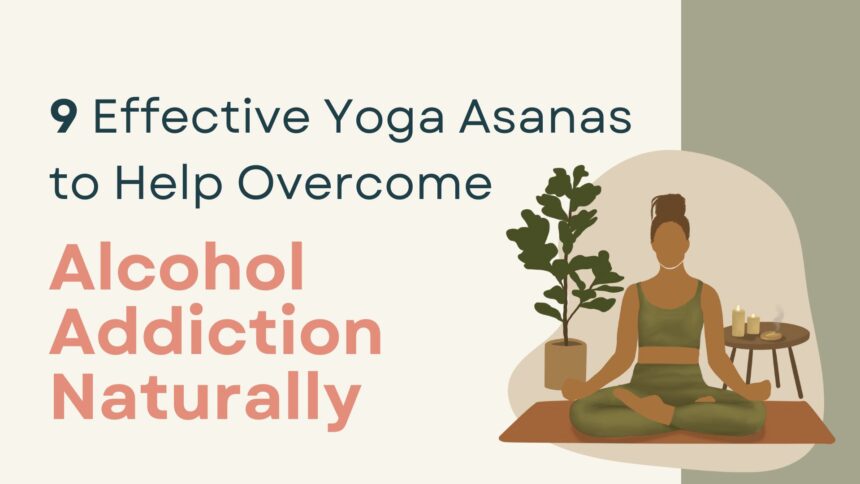Alcohol addiction is a serious issue that affects both the mind and body. It can lead to physical dependency, emotional imbalance, and disrupt daily life. While medical treatments like Anti Addiction Medicine are available, practicing yoga can be a powerful complementary tool for overcoming alcohol addiction. Yoga not only helps detoxify the body but also aids in mental relaxation, stress management, and emotional healing. Some specific yoga asanas (poses) can improve overall well-being and support the recovery process, including Yoga for Sleep, which is crucial for restoring health.
In this blog, we’ll discuss nine yoga asanas that can assist in overcoming alcohol addiction.
Understanding Alcohol Addiction
Before diving into the yoga asanas, it’s essential to understand the nature of alcohol addiction. Prolonged alcohol use leads to both physical and psychological dependence. Overcoming addiction requires a holistic approach that includes detoxification, mental health support, and lifestyle changes. Yoga is one such holistic tool that can play a significant role in the recovery journey.
The Role of Yoga in Recovery
Yoga combines physical postures, breathing exercises, and meditation to balance the mind and body. For those struggling with alcohol addiction, yoga can reduce cravings, manage withdrawal symptoms, and improve mental clarity. Additionally, regular yoga practice enhances physical health, which may have been compromised due to substance abuse.
9 Yoga Asanas to Help Overcome Alcohol Addiction
1. Balasana (Child’s Pose)
Balasana is a restorative yoga pose that helps calm the mind, relieve stress, and reduce tension in the body. It encourages deep breathing and mindfulness, which are essential for addiction recovery.
How It Helps
- Promotes relaxation and reduces anxiety.
- Helps control cravings by promoting mental clarity.
2. Shavasana (Corpse Pose)
Shavasana is a relaxation pose often practiced at the end of a yoga session. It helps in calming the nervous system, reducing stress, and promoting emotional balance.
Why Practice Shavasana?
- It helps reduce withdrawal symptoms by calming the mind.
- Encourages better sleep patterns, contributing to Yoga for Sleep.
3. Naukasana (Boat Pose)
Naukasana strengthens the core and improves balance. It also enhances willpower, which is essential for overcoming alcohol addiction.
Benefits of Naukasana
- Boosts physical and mental strength.
- Helps improve self-control, aiding in the fight against cravings.
4. Setu Bandhasana (Bridge Pose)
This asana stretches the chest, neck, and spine while also stimulating the abdominal organs. It is known to improve digestion and detoxification, which can be beneficial for those undergoing withdrawal.
Detoxifying Effects
- Helps in cleansing the liver and kidneys.
- Improves circulation and releases tension in the body.
5. Paschimottanasana (Seated Forward Bend)
This forward bend pose is excellent for stretching the hamstrings and lower back while promoting relaxation. It helps in calming the mind and reducing stress, which are key elements in addiction recovery.
Why It’s Effective
- Reduces stress and anxiety levels.
- Encourages mindfulness and emotional balance.
6. Bhujangasana (Cobra Pose)
Bhujangasana opens the chest and strengthens the spine. This pose helps detoxify the liver and kidneys, which is essential for individuals recovering from alcohol addiction.
How It Helps
- Aids in detoxification and improves liver function.
- Enhances emotional stability by stimulating the nervous system.
7. Uttanasana (Standing Forward Bend)
Uttanasana stretches the back of the body and helps calm the mind. This pose is particularly helpful in improving blood circulation, which is important for detoxification and recovery.
Benefits of Uttanasana
- Helps in releasing emotional tension.
- Reduces cravings by calming the mind and improving focus.
8. Virabhadrasana (Warrior Pose)
The Warrior pose is a powerful standing posture that builds strength and stamina. It enhances willpower and helps in building mental and physical resilience, both of which are important for overcoming addiction.
Why Practice Warrior Pose?
- Boosts confidence and mental strength.
- Improves focus and reduces mental distractions, helping to manage cravings.
9. Dhanurasana (Bow Pose)
This back-bending pose stretches the entire front of the body, improves posture, and stimulates the abdominal organs. Dhanurasana helps in improving digestion and detoxification, both of which are crucial during addiction recovery.
Detoxifying Benefits
- Stimulates the digestive organs, aiding in the detox process.
- Enhances emotional well-being by releasing tension from the body.
Additional Tips for Using Yoga to Overcome Alcohol Addiction
Incorporating yoga into your daily routine can significantly aid in your journey to overcoming alcohol addiction. However, combining yoga with other holistic treatments like Anti Addiction Medicine may provide faster results. Yoga helps reduce cravings, improve mood, and restore physical health, making it a valuable tool for recovery.
Focus on Breath Control (Pranayama)
In addition to these asanas, practicing pranayama (breathing exercises) can help you manage stress and improve mental clarity. Breathing exercises like Nadi Shodhana (alternate nostril breathing) and Kapalbhati (skull-shining breath) can calm the nervous system and help control addictive urges.
Practice Mindfulness
Mindfulness is a critical element in yoga that encourages you to stay present and aware. This mental state can reduce cravings and prevent relapses, as it helps you become more conscious of your thoughts and emotions.
Create a Routine
Consistency is key when using yoga for addiction recovery. Set aside time each day to practice yoga, even if it’s just 10-15 minutes. Over time, you’ll notice improvements in your physical and emotional health, making it easier to overcome alcohol dependence.
Conclusion
Yoga offers a powerful, natural method to help individuals struggling with alcohol addiction. These nine yoga asanas promote physical detoxification, improve emotional balance, and enhance mental clarity—all essential for overcoming addiction. By incorporating these poses into your daily routine, along with treatments like Anti Addiction Medicine, you can support your journey toward a healthier, addiction-free life.
Additionally, yoga can help with other health challenges you may face. For instance, practicing Yoga for Sleep can improve your sleep patterns, which is critical during recovery. Moreover, addressing conditions like Male Infertility, often caused by lifestyle factors, can benefit from the mental and physical balance that yoga provides.
Remember that overcoming addiction is a process, and combining holistic practices like yoga with professional medical support can offer the best chance for long-term recovery.





